Results
-
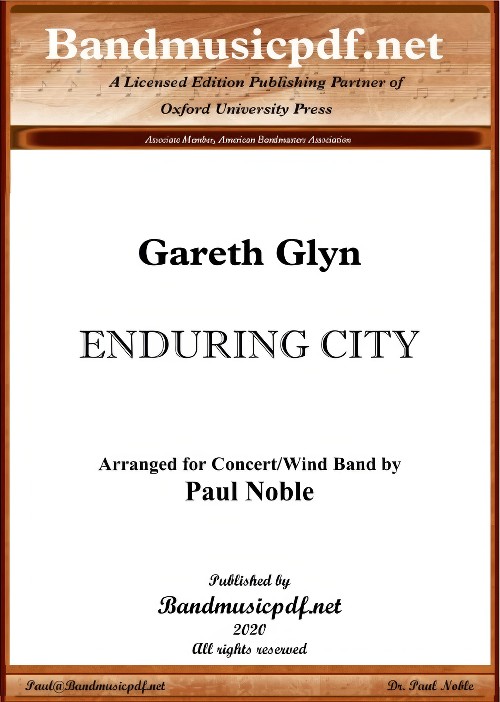 £295.00
£295.00Enduring City (Concert Band - Score and Parts) - Glyn, Gareth - Noble, Paul
Enduring City was composed to celebrate the 300th anniversary of the founding of New Bern, the first permanent seat of the colonial government of the state of North Carolina. It was first settled in 1710 by Swiss and German immigrants under the leadership of Christoph von Graffenried and and John Lawson. The 2010 composition was commissioned by the New Bern 300th Anniversary Committee and the City of New Bern, to portray the city in terms of its history, its present and its optimism for the future; the North Carolina Symphony gave its first performances, in venues throughout the state. Its one continuous movement is in well-defined sections. Most of the musical themes derive from names of people and places connected with New Bern, using letters that are also note-names, omitting those which are not. For example, the opening trumpets spell out E-B-E-D for New Bern ('R' standing for Re, which is D in fixed-doh sol-fa notation) and B-C-G for Baron Christoph von Graffenried. They are answered by the orchestra's "John Lawson, Gent.", the name on the cover of the co-founder's A New Voyage to Carolina. Lawson's questing and adventurous character is then suggested, accompanied by a "Carolina" note-name theme; and, after the Graffenried theme on solo horn, the music of both men combines for their voyage, culminating (on trumpets and trombones) in the founding of New Bern. The story of Tryon Palace, central to the city's history, is represented by echoes of the various kinds of music heard at the Governor's residence - fife and drum bands, minuets and the slaves' "Jonkonnu" festivals from Africa, celebratory fanfares and fireworks; the section reaches a climactic ending when all are combined. After a peremptory interruption by the snare drum, the perky fife theme is transformed to portray the conflicts that visited New Bern over the centuries, alternating with a new "grief" theme, which - when sounded by strings alone - leads to music of reconciliation and then of the natural beauty of the city's surroundings. A steady, lively rhythm underpins the final section, confidence - in the present and for the future. Echoes of previous themes are heard, but the closing peroration is reserved for a majestic and joyous statement of the name of New Bern itself.
Estimated dispatch 7-14 working days
-
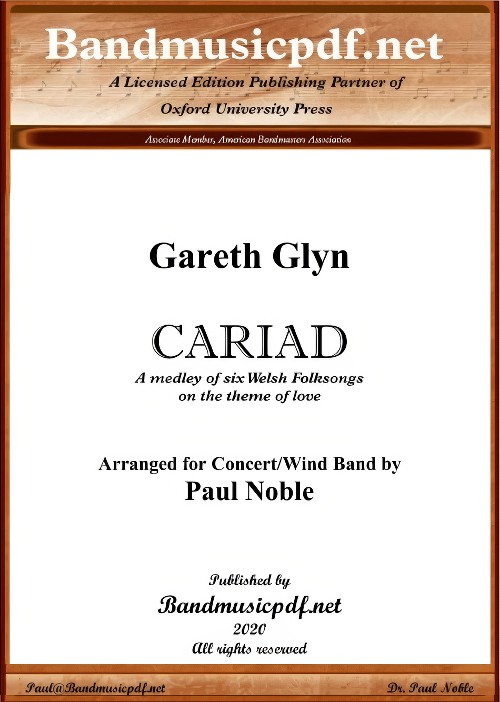 £150.00
£150.00Cariad (Concert Band - Score and Parts) - Glyn, Gareth - Noble, Paul
Cariad, a Welsh word meaning 'true love', 'great love', is a composition by Welsh composer Gareth Glyn, featuring six folksongs based on the theme of love: Dacw Nghariad (There's my love); Bugeilio'r Gwenith Gwyn (Watching the White Wheat); Mae Nghariad I'n Fenws (My Love is a Venus); Y Deryn Pur (The Message Bird); Tra Bo Dau (While Two Remain); Hen Ferchetan (The Old Spinster). Originally composed for Children's Choir and Orchestra, the composer then revised it for orchestra, on which this arrangement for Concert/Wind Band has been adapted. The contemporary setting brings a special lift and expression of joy to this unique folksong setting.
Estimated dispatch 7-14 working days
-
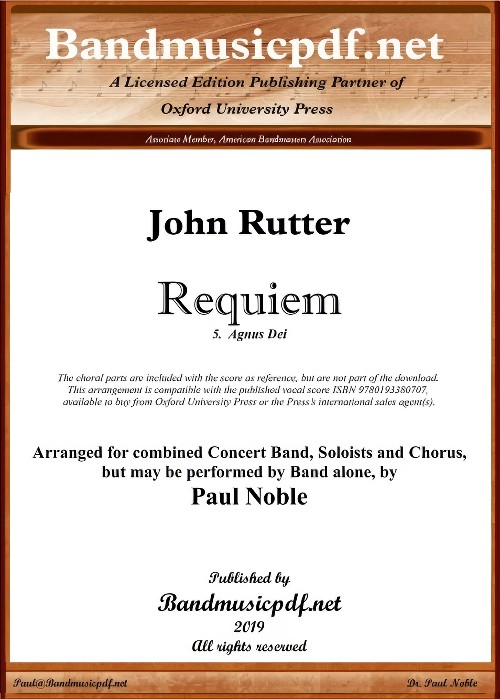 £110.00
£110.00Agnus Dei (from Requiem) (Concert Band with Optional Choir - Score and Parts) - Rutter, John - Noble, Paul
John Rutter's Requiem is a musical setting of parts of the Latin Requiem with added psalms and biblical verses in English, completed in 1985. This arrangement is scored for soprano, mixed choir and Concert/Wind Band. It may be performed by band alone. Five of its seven movements are based on text from the Latin Requiem Mass, while the second movement is a setting of Out of the deep (Psalm 130) and the sixth movement is an anthem The Lord is my Shepherd (Psalm 23) which Rutter had earlier written. The cello solo of the second movement is maintained, but also scored as a bassoon solo. The first movement combines the Introit and Kyrie, the third is Pie Jesu, with soprano solo. The central movement is a lively Sanctus, followed by Agnus Dei and finally Lux aeterna. In the Agnus Dei and Lux aeterna, Rutter combines the liturgical Latin text with English biblical verses. The arranger has added the tolling of the bell at the end, which can be as few or as many as may be appropriate for the occasion.
Estimated dispatch 7-14 working days
-
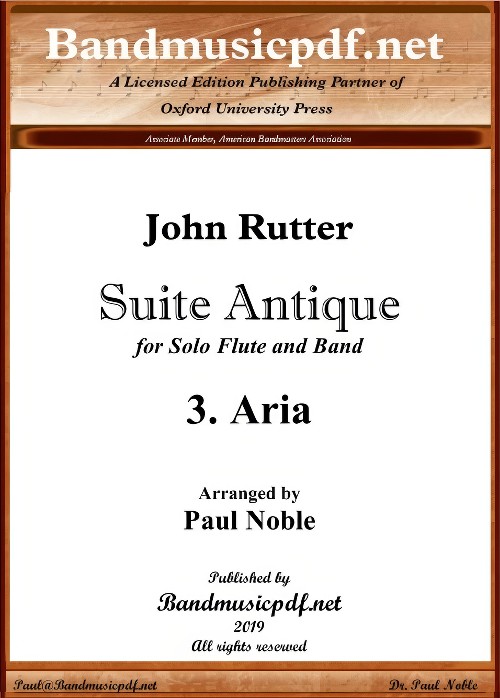 £75.00
£75.00Aria (from Suite Antique) (Flute Solo with Concert Band - Score and Parts) - Rutter, John - Noble, Paul
Suite Antique is a 1979 concertante work by John Rutter that is written for harpsichord, flute and string orchestra. Rutter composed the piece, in six movements, for a concert at which Bach's fifth Brandenburg concerto was to be performed, and so decided to write the piece for the same ensemble. This arrangement for Concert/Wind Band and Solo Flute adheres to the original presentation, but is expanded for a full band accompaniment to the solo flute. The harpsichord is optional, being cued elsewhere, but may be performed as in the original score by either harpsichord or an electronic keyboard with a similar setting. A jazz drumset is optionally included in the fourth (jazz waltz) movement, and other percussion discretely added in other movements. It is exciting to hear earlier musical forms brought into today's music appreciation, and this setting of a flute solo with band is especially refreshing for both soloist and band.
Estimated dispatch 7-14 working days
-
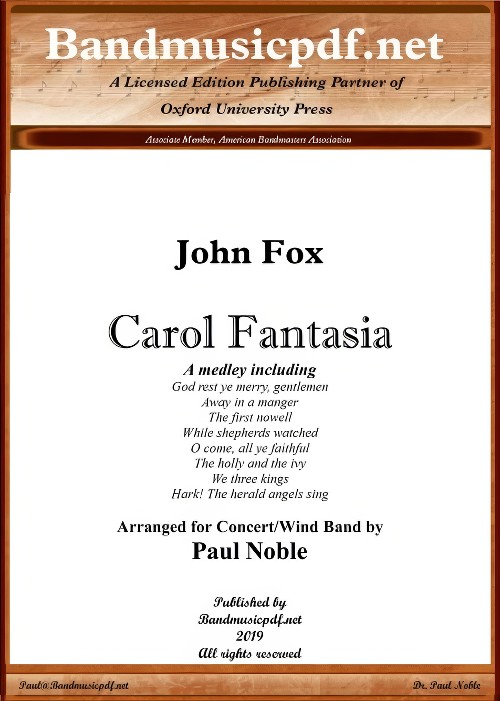 £150.00
£150.00Carol Fantasia (Concert Band - Score and Parts) - Fox, John - Noble, Paul
Carol Fantasia was written for the BBC Radio Orchestra's regular Tuesday night BBC Radio 2 showcase programme. It features the following carols and Christmas hymns: God rest you merry, gentlemen, Away in a manger, The First Nowell, While shepherds watched, O come all ye faithful, The Holly and the Ivy, We three kings, and Hark! the Herald Angels sing. The arrangement for Concert/Wind Band contains the original orchestra inclusion of celesta, piano, and harp, all of which are optional in this arrangement, with parts covered elsewhere. A bold, dramatic and colourful setting, this is a joyous and powerful concert opener or closer.
Estimated dispatch 7-14 working days
-
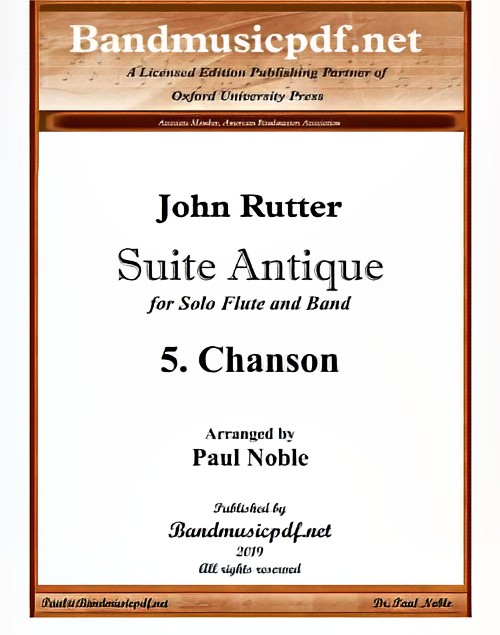 £95.00
£95.00Chanson (from Suite Antique) (Flute Solo with Concert Band - Score and Parts) - Rutter, John - Noble, Paul
Suite Antique is a 1979 concertante work by John Rutter that is written for harpsichord, flute and string orchestra. Rutter composed the piece, in six movements, for a concert at which Bach's fifth Brandenburg concerto was to be performed, and so decided to write the piece for the same ensemble. This arrangement for Concert/Wind Band and Solo Flute adheres to the original presentation, but is expanded for a full band accompaniment to the solo flute. The harpsichord is optional, being cued elsewhere, but may be performed as in the original score by either harpsichord or an electronic keyboard with a similar setting. A jazz drumset is optionally included in the fourth (jazz waltz) movement, and other percussion discretely added in other movements. It is exciting to hear earlier musical forms brought into today's music appreciation, and this setting of a flute solo with band is especially refreshing for both soloist and band.
Estimated dispatch 7-14 working days
-
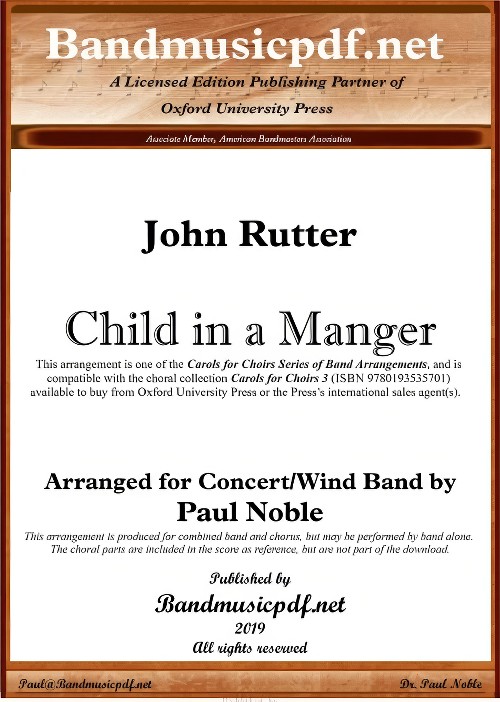 £75.00
£75.00Child in a Manger (Concert Band with Optional Choir - Score and Parts) - Rutter, John - Noble, Paul
The tune for Child in a manger first appeared as Bunessan, composed in the Scottish Islands, published in 1900 as a Christmas carol with lyrics translated from the Scottish Gaelic by Mary McDonald. The hymn tune later appeared in 'Songs of Praise', published in 1931 as Morning has Broken. This arrangement represents one in the Series of Band Arrangements compatible with David Willcocks' Carols for Choirs.
Estimated dispatch 7-14 working days
-
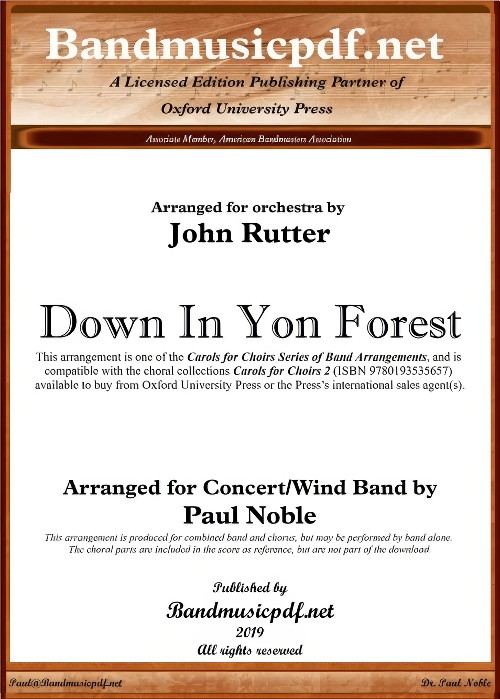 £75.00
£75.00Down in Yon Forest (Concert Band with Optional Choir - Score and Parts) - Rutter, John - Noble, Paul
Down in Yon Forest is a traditional English Christmas carol dating to the Renaissance era, ultimately deriving from the anonymous Middle English poem known today as the Corpus Christi Carol. The carol has been arranged in modern English by John Rutter. This arrangement represents one in the Series of Band Arrangements compatible with David Willcocks' Carols for Choirs.
Estimated dispatch 7-14 working days
-
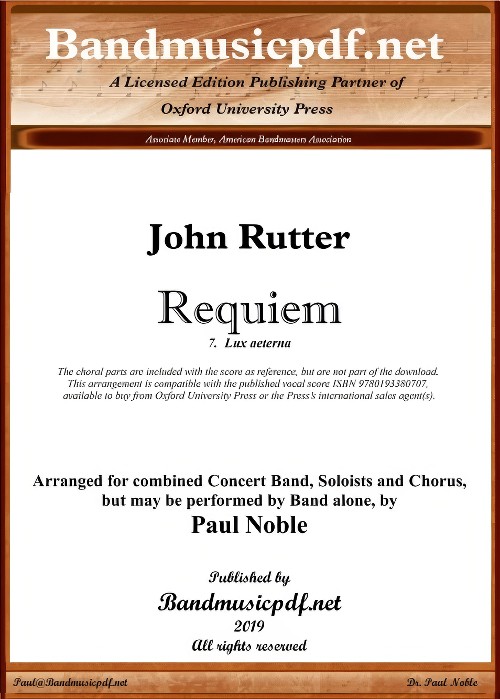 £110.00
£110.00Lux Aeterna (from Requiem) (Concert Band with Optional Choir - Score and Parts) - Rutter, John - Noble, Paul
John Rutter's Requiem is a musical setting of parts of the Latin Requiem with added psalms and biblical verses in English, completed in 1985. This arrangement is scored for soprano, mixed choir and Concert/Wind Band. It may be performed by band alone. Five of its seven movements are based on text from the Latin Requiem Mass, while the second movement is a setting of Out of the deep (Psalm 130) and the sixth movement is an anthem The Lord is my Shepherd (Psalm 23) which Rutter had earlier written. The cello solo of the second movement is maintained, but also scored as a bassoon solo. The first movement combines the Introit and Kyrie, the third is Pie Jesu, with soprano solo. The central movement is a lively Sanctus, followed by Agnus Dei and finally Lux aeterna. In the Agnus Dei and Lux aeterna, Rutter combines the liturgical Latin text with English biblical verses. The arranger has added the tolling of the bell at the end, which can be as few or as many as may be appropriate for the occasion.
Estimated dispatch 7-14 working days
-
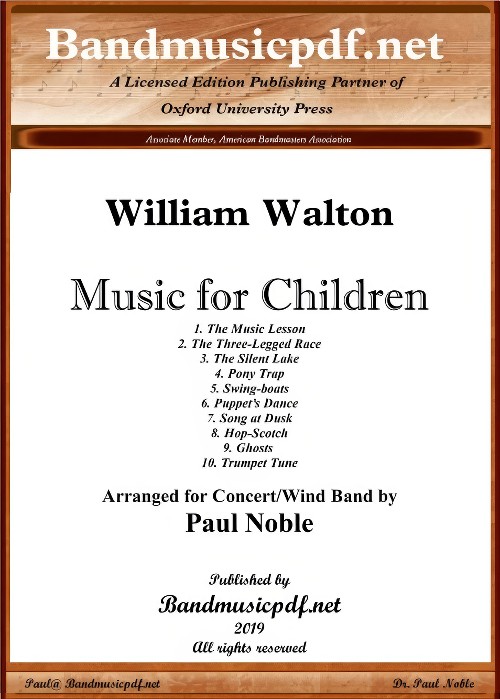 £295.00
£295.00Music for Children (Concert Band - Score and Parts) - Walton, William - Noble, Paul
Music for Children, 1940-1, was originally written as piano duets, and arranged for orchestra by the composer from the Duets for Children (1940). There are ten short movements with depictive titles. Nine of the numbers originally existed in versions for piano solo, entitled Tunes for My Niece. The scoring for band is sometimes characteristically thin, capturing the intimate childlike musical descriptions, and occasionally full, showing absolute excitement and youthful delight.
Estimated dispatch 7-14 working days
